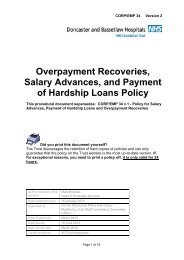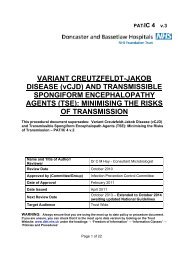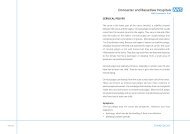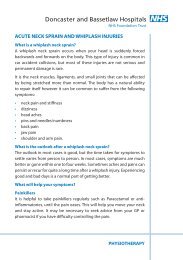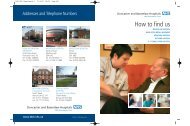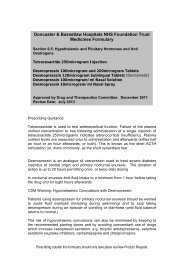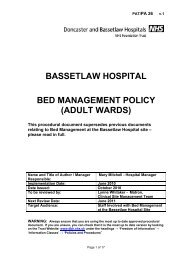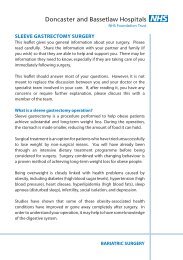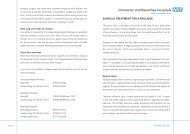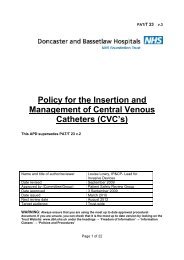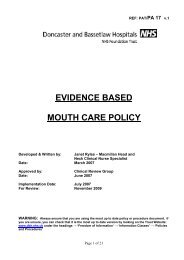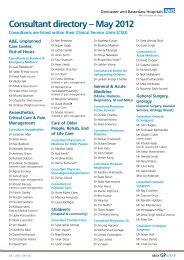Last Offices Policy - Doncaster and Bassetlaw Hospitals NHS ...
Last Offices Policy - Doncaster and Bassetlaw Hospitals NHS ...
Last Offices Policy - Doncaster and Bassetlaw Hospitals NHS ...
You also want an ePaper? Increase the reach of your titles
YUMPU automatically turns print PDFs into web optimized ePapers that Google loves.
Page 8 of 11<br />
REF: PAT/T 30 v.1<br />
Judaism: Prefer no post mortem unless required by law. Cremation is<br />
forbidden. Dying person should not be left alone, may wish to hear special<br />
psalms <strong>and</strong> prayers, can be said by a relative or Rabbi. Patients must not be<br />
washed <strong>and</strong> should remain in the clothes in which they died. The body will be<br />
washed in a ritual purification. It is important that the body is released to<br />
family as soon as possible.<br />
Mormon: Do not object to post mortem. No rituals for dying, however<br />
spiritual contact is important. Routine last offices appropriate, if wearing a<br />
sacred undergarment must be replaced on body following last offices. Burial<br />
is preferred.<br />
Muslim: Prefer no post mortem unless required by law. Patients may wish to<br />
face Mecca (South East). Family/friends may sit with patient reading the Holy<br />
Quran <strong>and</strong> making supplication. At death do not wash the body. Where no<br />
relatives are available, staff should wear gloves to avoid direct contact with<br />
the body. The body should face Mecca <strong>and</strong> the head should be turned<br />
towards the right shoulder before rigor mortis begins. The body can be made<br />
respectable by combing hair <strong>and</strong> straightening limbs, however the family will<br />
ritually wash the body before burial. The body of a female should be prepared<br />
by a female member of staff <strong>and</strong> vice versa for a male body. It is important to<br />
bury a body as quickly as possible.<br />
Plymouth Brethren: As death approaches family may wish to keep a 24<br />
hour vigil. After death the family may wish to attend to <strong>Last</strong> <strong>Offices</strong><br />
themselves. Prefer no post mortem unless required by law.<br />
Quakers: Do not object to post mortem. No special rules or practices for the<br />
dying, will appreciate a visit from an Elder or other Quakers who may sit in<br />
silent worship.<br />
Rastafarianism: Post mortem is extremely distasteful to most Rastafarians,<br />
unless required by law. Routine last offices appropriate. Burial preferred.<br />
Romany origin: Many people of Romany origin are Christians. If a traveller<br />
is dying, family/friends from around the country will wish to visit before death,<br />
meaning that there will often be many visitors. After death, the family will<br />
request that the person be laid out in clothing of their choice.<br />
Sikhism: No objection to post mortem, however prefer not to if possible.<br />
Sikh men wear the five K’s: kesh (long hair kept under a turban), kangha (a<br />
small comb worn in the hair), kara (steel bracelet or ring worn on right wrist),<br />
kachha (special type of underwear) <strong>and</strong> kirpaan (sword worn symbolically by<br />
baptised Sikhs. After death routine last offices may be performed, but the 5<br />
K’s should not be removed. Body is cremated.<br />
Zoroastrian/Parsis: No religious objection to post mortem. Routine last<br />
offices are appropriate. Believe it necessary to commence prayers as soon<br />
as possible after death. No preference for burial or cremation.



